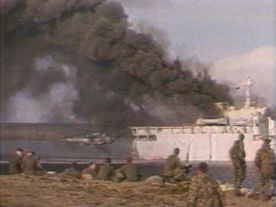Falklands: Cameron is a fool to send in the troops - Argentina's army is a penniless rabble

Following news of the deployment of more British troops in Las Malvinas in response to a supposed arms deal between Argentina and Russia, there are a few things that must be said.
First, the Argentine army is in no condition to defend its own country. Its military troops have been forced to relocate from the borders to take care of internal insecurity due a lack of personnel within the rest of the security forces.
The military logistics by sea, air and land are in their worst shape in decades: ships are being sunk while they are moored, pilots are not flying so they have no experience, plus their planes are in pieces as a result of budget cuts over several years.
One example of how the current government treats its armed forces can be seen in what happened in July 2013 to the ARA Santisima Trinidad, a Type 42 destroyer of the Argentine Navy that took part in the 1982 war. The ship was sunk at her moorings in Puerto Belgrano due to the absence of the most basic maintenance.
The ridiculous reaction by the UK government shows a deep lack of understanding regarding how President Cristina Fernández de Kirchner's administration works. But now they have given it the perfect excuse to carrying on with its nationalistic rhetoric, one of the main ideological tools applied by the head of state.
Machiavelli lives on
Yet, in reality, Prime Minister Cameron uses exactly the same tactic as the Argentine government. He grabs a polemic issue in order to distract public opinion from local problems. The Florentine historian Niccolò Machiavelli defined this as the 'foreign factor' which unites the people under one common goal.
Machiavelli wrote 500 years ago, yet his nostrums are clearly still relevant today.
In the past few months, several curious episodes have taken place in the Argentine armed forces.
In 2011, 154 FAL assault rifles suddenly vanished from a deposit belonging to the 603 battalion. In response, Defence Minister Agustín Rossi dismissed Hugo Victor Meola, head of the military arsenals in the Argentine army.

Yet just last February, units of 9 and 32mm ammunition were stolen from the same place. A month earlier, a wire-guided anti-tank missile named TOW disappeared from the 1<sup>st Armoured Cavalry squadron in La Plata, Buenos Aires province. None of these cases has yet been solved.
The persecution continues apace
During the Fernández de Kirchner government, the military top brass were re-orientated from their original objective of defending the country from an external threat. Instead of that, they are using the army for humanitarian missions against weather disasters both locally and abroad.
But there is one more purpose towards which the Argentine armed forces have worked efficiently and systematically since the appointment of Lieutenant General César Santos del Corazón de Jesús Milani as head of the army.
Under Milani's leadership, and thanks to the millions transferred by Commander in Chief Fernández de Kirchner, the persecution of opposition members, journalists and human rights activists (including the Mothers of Plaza de Mayo, a group of Argentine women whose children were 'disappeared' during the country's military dictatorship) have increased since he assumed control in July 2013.
The main destiny of the funds has been the intelligence sector, the area from where Milani emerged. He is currently being investigated for alleged crimes against humanity during the last dictatorship, between 1976 and 1983.
It is clear that the Argentine security forces are locked on other targets, and one cannot take seriously a supposition arguing that the South American country is willing to conquer the disputed islands because of its negotiations with third parties like Russia and China.

Even if it wanted to, Argentina could never engage in a military operation, due to the outrageous situation of its armed forces and the appalling image cultivated by the present government among the populace.
For years, the Argentine government used the Malvinas War for political reasons, the same way it did with the human rights issue. And the same could happen again, even though this government is not capable of supplying security to its own citizens, as they are victims of violence in the streets all around the country, every day.
A couple of years ago, current Cabinet Chief Aníbal Fernández said the country's crime epidemic "is only a feeling", a sentence that will live on in infamy. A country that is not able to keep its citizens safe from harm is a country that under no circumstance can go to war.
Today Argentina commemorates 39 years since the military coup that installed a Junta regime and 'disappeared' thousands of people. That horrific time should serve as a reminder that nationalist rhetoric has no place in modern society. Negotiation, not jingoism, is the way forward.
Damian Pachter is a 30-year-old Argentine-Israeli journalist who has worked for the BBC, AP, the Buenos Aires Herald, and as a correspondent for Haaretz newspaper in Argentina.
© Copyright IBTimes 2025. All rights reserved.






















